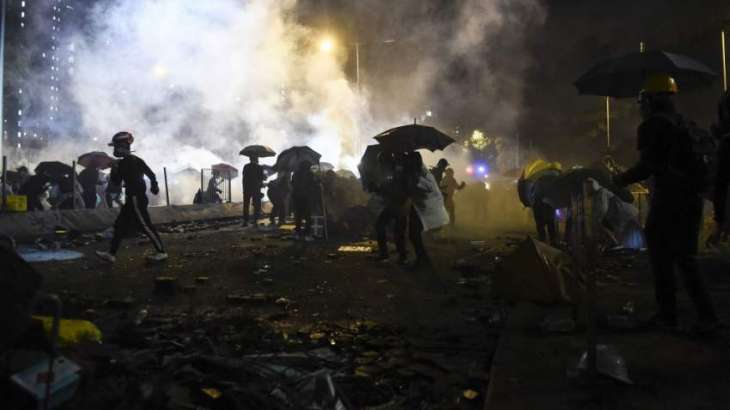As Wallace Tang, a 22-year-old student of Hong Kong Polytechnic University (PolyU), found himself besieged for days on campus amid a police operation to quell violent student protests, he still is unwilling to give up on the anti-extradition movement and is even ready to face arrest and other consequences entailed by participating in rioting
MOSCOW (Pakistan Point News / Sputnik - 19th November, 2019) As Wallace Tang, a 22-year-old student of Hong Kong Polytechnic University (PolyU), found himself besieged for days on campus amid a police operation to quell violent student protests, he still is unwilling to give up on the anti-extradition movement and is even ready to face arrest and other consequences entailed by participating in rioting.A violent standoff that began on Sunday and carried through to Monday unfolded when, following violent clashes, police closed all of the university's exits, trapping hundreds of student protesters inside. The demonstrators then began hurling petrol bombs, bamboo poles and bricks, and even shooting arrows at the police. In response, the police used tear gas and water cannons. About 600 activists have surrendered, while another 100 remain on the university's campus.
Hong Kong Chief Executive Carrie Lam has vowed to "continue to persuade and arrange for these remaining protesters to leave the campus as soon as possible" so that the operation could be ended peacefully.
During a press briefing on Monday, John Lee, the secretary of security in Hong Kong, said that everyone trapped inside PolyU would be arrested for taking part in rioting.
Despite being stranded at PolyU for several days with basic necessities such as food and water running low, Tang is among those who have no intention of surrendering.
"If I'm arrested, I will finish my degree and try to get a master in prison. And then wait to serve the further days [of my sentence]," Tang told Sputnik.
In spite of his staunch position, Tang said he understood those who decided to turn themselves in.
"It [the surrender] is understandable because they are only children and they can't bear this kind of suffering," he said.
But Tang is determined to take a stand until the end, even if it means being arrested by the police.
"Since I joined the movement in June, I have been prepared for the arrest," he said.
The young student explained that he was willing to make the personal sacrifice of going to prison not for himself, but for the two million people in Hong Kong who support the ongoing protests.
"If it's only for me, it's not worth [going to prison for it]. But for the two million people [who support us], it must be worth it," he said.
NO APOLIGIES FOR CAUSE PROTESTERS DEEM 'RIGHTEOUS'
Arriving with four friends last Friday, the PolyU student majoring in engineering said he was merely trying to defend his school.
"I am a PolyU student and now I also can't understand why the police destroy our home that we try to protect. But they say we are joining a riot and we need to bear a very high cost for our protection. It's about righteousness. They use their military power to try to 'kill' us. That's why I still am on the campus. Everyone is seeing what's they are doing. We [the students] are on the right side," Tang said.
His daily meal had been reduced to a few biscuits after supplies offered by volunteers and supporters of the movement started becoming exhausted.
"I will fight until they [the police] come inside the campus. I will not surrender because I won't let the government show to the public that it's like we apologized for the movement. We are on the right side," he said.
Tang admitted that he suffered minor injuries during clashes with the police, but stressed that his injuries were nothing compared to those of others who suffered more serious injuries at the hands of the police.
The massive protests began in Hong Kong in early June over a controversial extradition bill, which was officially withdrawn in October. During the first two weeks of largely peaceful protests, as many as two million people poured into the streets of Hong Kong in support of the movement, which expanded its demands to include an independent investigation into alleged police brutality and greater civil liberties like universal suffrage.
He argued that the escalating violence during protests in recent months was a response to the government continuing to ignore the protesters' demands.
"Even when we had two million people joining the parade to show our demands, the government still ignored them and kept on trying to introduce the new law. They showed that our peaceful demonstrations were useless. That's why our movement is leveling up," he said.
Lam continued to call on protesters to end their violent acts and return to trying to resolve their grievances through peaceful dialogue.
But young protesters like Tang are worried growing pressure from the central government in Beijing could hurt democratic rights and freedoms people enjoy in Hong Kong, and turn the "One Country, Two Systems" policy into "One Country, One system."
Under the 1984 Sino-British Joint Declaration, the United Kingdom and China agreed to an arrangement, known as "One Country, Two Systems," that made Hong Kong a special administrative region of the People's Republic of China where local residents enjoyed separate political, economic and individual freedoms for at least 50 years after the handover in 1997.
Authorities in Beijing have repeatedly stressed that they plan to adhere to the "One Country, Two Systems" and alleged the situation in Hong Kong was a result of foreign interference in China's domestic affairs.




